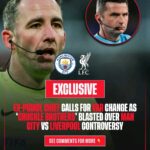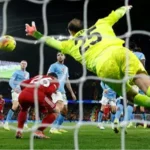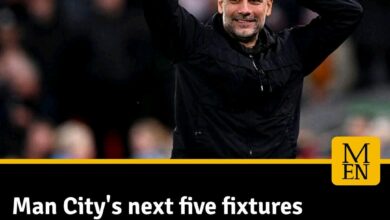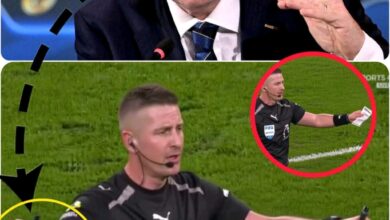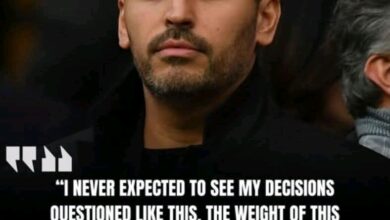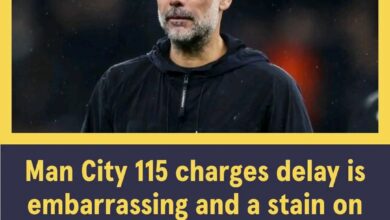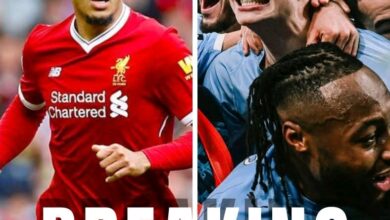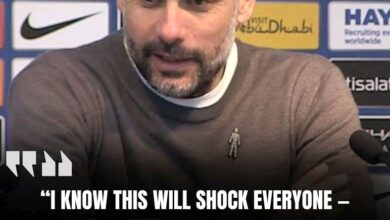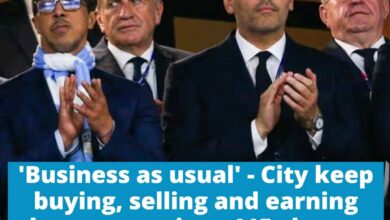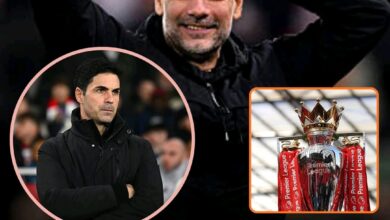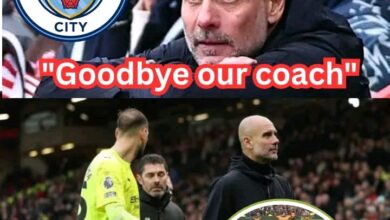Liverpool vs Manchester city var decision goes wrong
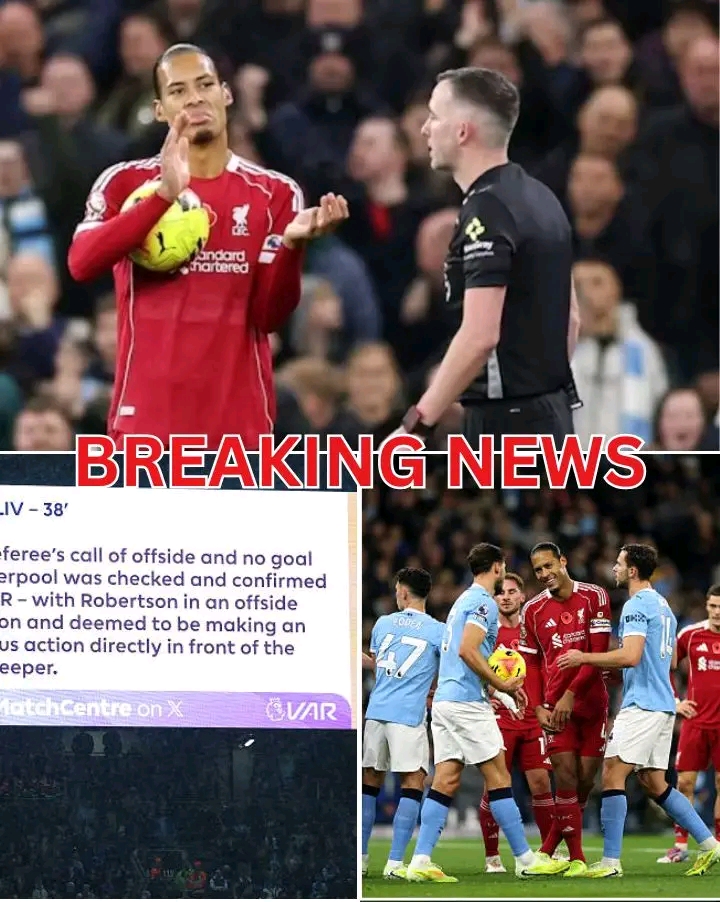
It was a day that Liverpool fans will remember for all the wrong reasons, a day that left the city of Liverpool in disbelief and frustration, a day when the footballing world watched as one of England’s most iconic clubs struggled to find answers in the shadow of Manchester City’s brilliance. On November 9, 2025, Liverpool traveled to the Etihad Stadium with hope, pride, and the determination to claim a crucial Premier League win. They were faced with Pep Guardiola, a man whose tactical genius and meticulous preparation have become the stuff of legend, managing his 1000th match as a professional coach. The atmosphere was electric, the stakes high, and the tension palpable. Yet, by the final whistle, the scoreboard told a harsh story: Manchester City 3, Liverpool 0.
From the opening whistle, the game promised intensity. Liverpool, under the stewardship of Dutch manager Arne Slot, looked to assert themselves, pressing high, controlling possession when possible, and attempting to unsettle City’s rhythm. The Reds came into the match with confidence, even though this season had been anything but consistent. In the early stages, the match ebbed and flowed with both teams probing for weaknesses. Liverpool’s energy and pressing were commendable, and for moments, it seemed as though they could dictate the pace of the game. But City, as always, were prepared, patient, and clinical.
The first major incident of the match came in the 13th minute. Liverpool’s stand-in goalkeeper, Giorgi Mamardashvili, a Georgian shot-stopper deputizing in place of Alisson Becker, showed why he had been trusted with the responsibility. Erling Haaland, Manchester City’s towering striker, was denied from the penalty spot by the young goalkeeper, who dived with impeccable timing to parry the ball away. For Liverpool, it was a moment of hope, a sign that they could compete, a reminder that fine margins would decide the game. Fans erupted in the stands and across social media, praising Maardashvili’s heroics.
However, football has a way of turning moments of promise into lessons of humility. Just sixteen minutes after that heroic save, Haaland’s persistence paid off. The Norwegian striker, whose presence alone terrifies defenders, found space in the box and made no mistake, slotting the ball past Mamardashvili to break the deadlock. The Etihad erupted, City fans cheered, and the scoreboard told a simple story: 1-0 to Manchester City. For Liverpool, the early sense of optimism began to fade.
In response, the Reds tried to rally. Mohamed Salah and Darwin Núñez linked up with intensity, and Liverpool pressed for an equalizer. The breakthrough seemed imminent when, just before half-time, captain Virgil van Dijk rose to meet a corner, heading powerfully toward goal. The stadium roared; Liverpool supporters dared to dream that their side had pulled themselves level. But their celebrations were brutally cut short. VAR intervened, and the referee’s decision stood: the goal was disallowed. Andy Robertson, the Scottish left-back, had been adjudged to be in an offside position and interfering with the goalkeeper’s line of sight.
The disallowed goal sparked immediate debate, outrage, and confusion. Liverpool fans flooded social media with their anger, claiming their team had been “robbed” of a vital goal. The Premier League released a statement shortly after to clarify the situation: “The referee’s call of offside and no goal to Liverpool was checked and confirmed by VAR – with Robertson in an offside position and deemed to be making an obvious action directly in front of the goalkeeper.” The statement did little to quell the outrage. Fans dissected every frame, analyzing Robertson’s positioning, Van Dijk’s header, and the goalkeeper’s reaction, each tweet and post fueling the conversation and igniting debates across forums, YouTube channels, and pundit panels.
Former Premier League referee Mark Clattenburg weighed in on the incident, offering a professional perspective. He explained that Robertson’s instinctive movement, ducking under Van Dijk’s header in an attempt not to block the goalkeeper, was interpreted as distracting, thus leading to the offside ruling. Clattenburg acknowledged the subjectivity of the decision, highlighting that football’s rules on offside and interference leave room for interpretation. For Liverpool, however, it was a bitter pill to swallow – a goal that could have changed the trajectory of the game was taken away in a moment of technicality, and with it, a sense of momentum.
The disallowed goal seemed to sap Liverpool’s energy. Before the halftime whistle, Manchester City capitalized once more. Nico Gonzalez, the industrious midfielder, finished a slick attacking move, putting City 2-0 up and firmly in control. For Liverpool, the half-time interval offered no comfort. Players trudged off the pitch, managers conferred, and fans were left questioning how their team could have conceded so easily, even after moments of promise. The psychological impact of the VAR decision was clear; the Reds looked a side struggling not just physically but mentally to cope with the brilliance of Guardiola’s men.
The second half provided little relief. Manchester City, knowing they had the advantage, continued to press, move, and exploit spaces. And in the 63rd minute, Jeremy Doku delivered the coup de grâce. The Belgian winger, renowned for his blistering pace, agility, and precision finishing, danced past defenders in a display reminiscent of Mohamed Salah’s best moments at Anfield. With a precise strike into the top corner, he sealed the three points for City, leaving Liverpool reeling and fans searching for explanations.
It was not just the scoreline that haunted Liverpool supporters; individual performances came under scrutiny. While the team’s collective play was criticized for inconsistency and lapses in concentration, defender Ibrahima Konaté became a particular target. Social media exploded with frustration directed at the French center-back, whose form has sparked rumors of a potential free transfer to Real Madrid at the end of the season. Fans were merciless. Comments ranged from humorous jabs to outright condemnation: “Replace Konaté in January, he seems disinterested and his head is in Madrid,” one supporter wrote. Another added, “Konaté needs to go in January. He can’t pass, his decision-making is atrocious, and he’s as strong as a bag of Haribo.” Others joked sarcastically about raising funds for him to move to Madrid immediately, underscoring the perception that his commitment and focus were lacking.
Despite the harsh criticism, it is important to remember that football is rarely about a single player. While Konaté struggled, the match highlighted wider issues: the mental resilience of Liverpool, their ability to respond to adversity, and the tactical challenges posed by a team of City’s caliber. Arne Slot, whose tenure has been marked by both triumphs and struggles, will undoubtedly reflect on the game, examining defensive structures, transitional play, and the execution of set pieces. It is a managerial challenge as much as it is a player’s test of character.
Beyond the tactical analysis, this match reignited long-standing debates about VAR, refereeing, and the rules of football. Supporters questioned whether VAR, intended to reduce errors, sometimes creates more confusion and frustration. The interpretation of interference with the goalkeeper’s line of sight remains one of football’s most controversial areas, as demonstrated by Robertson’s disallowed involvement. Fans, pundits, and former referees will continue to debate this incident for weeks, highlighting football’s fine margins and the thin line between fortune and misfortune.
In the larger context, Liverpool’s 3-0 defeat is another reminder of the Premier League’s relentless competitiveness. This season has been inconsistent for the Reds, with impressive victories often followed by disappointing results. The loss to City underscores the challenges of maintaining high standards week in and week out, especially against tactically astute opponents. It also raises questions about squad depth, player focus, and the ability to handle critical moments under pressure.
Looking ahead, Liverpool must regroup during the November international break. Players will return to their national teams with mixed emotions, reflecting on individual performances and team dynamics. Upon their return, they face Nottingham Forest at Anfield, a match that offers a chance to restore confidence and regain momentum in domestic competition. Following that, Liverpool will confront PSV Eindhoven in the Champions League, where European ambitions and pride are at stake. Finally, an away fixture against West Ham United concludes the month, presenting another opportunity to test consistency and resilience. Each match offers lessons, challenges, and the chance to respond to the adversity experienced at the Etihad.
For Pep Guardiola and Manchester City, the match was another testament to their tactical mastery, squad depth, and mental fortitude. Haaland’s opener, Gonzalez’s clinical finish, and Doku’s brilliance encapsulate a team that combines individual talent with collective intelligence. Guardiola’s ability to prepare, adapt, and exploit weaknesses is unmatched, and Liverpool’s defeat highlights the difficulty of confronting a side of such quality.
Fans, of course, are the lifeblood of football narratives. Liverpool supporters expressed anger, disappointment, and disbelief, particularly over the VAR call. Social media became a battlefield of opinions, memes, and analyses, with every replay scrutinized and debated. Yet the passion of the fanbase also reflects the club’s identity: a group unwilling to accept mediocrity, demanding high standards, and deeply invested in every twist of the game. This emotional investment is what makes football so compelling, uniting communities in celebration and shared frustration.
The Etihad defeat, with its controversial moments and harsh scoreline, will be dissected in countless ways. It serves as a reminder of football’s unpredictability, the importance of mental toughness, and the role of technology in shaping modern game outcomes. For Liverpool, it is a moment to learn, adapt, and prepare for the challenges ahead. Van Dijk, Robertson, Salah, and the rest of the squad must channel the disappointment into motivation, ensuring that setbacks do not define their season.
In conclusion, November 9, 2025, was a difficult day for Liverpool, a day of lessons, controversy, and reflection. The 3-0 defeat at the Etihad, Haaland’s goal, the disallowed Van Dijk strike, and Doku’s finishing brilliance will all be remembered as part of the narrative of a season filled with highs and lows. As the Reds look forward to upcoming matches, the focus must be on resilience, tactical improvement, and collective determination. Football is as much about response as it is about performance, and Liverpool’s challenge is clear: rise from adversity, learn from mistakes, and continue to compete at the highest level in both domestic and European competitions.
This match will be talked about for months, debated in media outlets, remembered by fans, and studied by analysts. It reflects the drama, passion, and unpredictability that make football the world’s most beloved sport. For Liverpool, it is a moment to regroup and refocus. For Manchester City, it is another statement of dominance. And for the footballing world, it is a reminder that in this sport, glory and heartbreak are never far apart.
